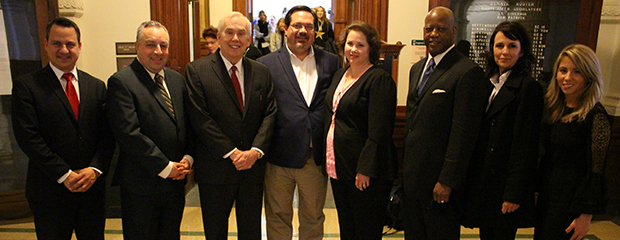Texans tell Senate: Attacks on religious freedom continue; will get worse without specific protections in law
With a major religious freedom case at the U. S. Supreme Court, and the failure of the Texas House to act on numerous religious freedom bills in 2017, Lt. Gov. Dan Patrick and the Texas Senate State Affairs Committee heard testimony this week on how to address the growing threats to religious freedom for the 2019 legislative session.
Several Texans and national religious freedom allies and experts spoke out on the Senate floor during the Texas Senate Committee on State Affairs hearing on Feb. 21 (click here to watch) to both acknowledge past legislative efforts to protect religious liberty in limited situations, and also suggest future policy measures.
The committee evaluated the passage of two bills supported by Texas Values in the 85th Legislature: the sermon safeguard law (SB 24) a bill that allows county clerks to not have their name on a marriage license (HB 555). But in 2017, there was no legislation passed to address the growing threats to private businesses, other government employees, parents, and faith-based entities on the issue of privacy in intimate facilities, and much more.
“Once government can dictate religious conscience, you’re not on a slippery slope, you’re on a cliff,” said Sen. Brian Birdwell, of the necessity of these new laws.
Texas Values President Jonathan Saenz was invited to testify on religious freedom issues, talking specifically about the importance of protecting county clerks, judges, and magistrates from being forced to perform marriage ceremonies that violate their sincerely held religious beliefs. Last session, though HB 555 allowed county clerks to remove their names from marriage licenses, full religious freedom protections for clerks were not passed.
“Although the Texas legislature passed laws to protect pastors’ sermons and allow clerks to remove their name from marriage licenses, attacks on religious freedom continue and will get worse if our state laws don’t extend protection to all Texans,” Saenz said. “We are grateful for Sen. Joan Huffman’s and Lt. Gov. Dan Patrick’s effort to make studying religious freedom a priority for Texas.”
Jonathan also cited a 2016 study by Georgetown University and the Newseum Institute which stated:
“The study’s most conservative estimate, which takes into account only the revenues of faith-based organizations, is $378 billion annually – or more than a third of a trillion dollars. By way of economic perspective, this is more than the global annual revenues of tech giants Apple and Microsoft combined.
“You only have to look across the hallway, at the House,” Saenz said, noting HB 192 in the last legislative session would have allowed the government to directly punish a church and its ability to keep men out of women’s bedrooms in homeless shelters and religious housing.
“You could have nuns going to jail,” Saenz added.
Saenz mentioned that Mississippi now has a comprehensive and specific religious freedom law that recently withstood a court challenge.
In other invited testimony, Teresa Kiel, Guadalupe County Clerk and legislative chair of the County and District Clerks Association of Texas, was asked why there haven’t been more county officials coming forward about being pressured to sign same-sex marriage certificates or perform ceremonies. “The fact that you don’t hear from them … may mean they’re afraid to come forward,” Kiel explained.
Chelsey Youman, counsel with First Liberty, advised the committee on the administrative costs of not defending religious liberty. As for ways the Texas Legislature can protect freedoms in the future, she suggested specific protection for religious staffing rights, occupational license protections (especially in the health care field), and protections for pregnancy centers that oppose abortion.
Samuel Green, legal counsel for Alliance Defending Freedom gave two examples of what can happen in the absence of religious freedom protections. Kelvin Cochran, a fire chief who was fired by the City of Atlanta because he wrote a book that included the definition of marriage as being between one man and one woman. Green also told the story of Baronelle Stutzman, a florist who is at risk to lose everything because she declined to create floral arrangements for a same-sex wedding, even though she routinely provided this service to everyone for other non-wedding events.
Other testimony included the emotional recount of Edie DeLorme, a cake baker from Longview in East Texas. Edie and her husband, David DeLorme, took over a century-old bakery as a way to help fund mission trips for their daughter and to serve their community. In 2016, Edie was approached by a same-sex couple at the bakery with the request that she would design a cake for their wedding. Edie said she politely declined to design the cake and gave the couple a list of other bakers that the couple could contact. The couple took the story to the media and soon the DeLormes and their employees received calls threatening the family — including physical assault threats directed at their son and that their house would be burned to the ground.
“Protecting the right of religious liberty is more than ensuring that a business owner is not forced to participate, validate, or promote something that violates their faith,” Edie DeLorme said. “It is about protecting the right for all of us business owner, employee, and individual alike to live according to our deeply held religious beliefs…”
Angela Smith, a fellow small business owner, testified with her concerns that business owners need specific religious liberty protections in Texas law so they are not punished for their sincerely held religious beliefs.
Pastor Charles Flowers, a leader of pro-religious liberty coalitions in San Antonio, echoed the words of the founding documents of our country which specifically protect religious freedom on views regarding sexuality in public schools. Taking a quote from John Adams, “Our Constitution was made only for a moral and religious People. It is wholly inadequate to the government of any other.”
Pastor Hernan Castano, one of the “Houston Five” pastors testified as well. Castano received a subpoena for his sermons by then Houston Mayor, Annise Parker because of his public opposition to the infamous Houston bathroom ordinance which would have forced businesses to allow men into women’s restrooms. Castano said there are policies in place which “invade the pulpit.” “No minister should ever edit their sermons … to comply with a law,” Castano said, before briefly sharing his account of his sermons being subpoenaed.
“It will never happen again, not in this state,” Sen. Joan Huffman assured Castano. Castano said that now that his sermons are safe from the government, he believes all Texans should be safe from government punishment based on religion, not just pastors.
Religious liberties are also at risk in the academic world, according to Dr. John Tyler, a Houston Baptist University government professor. Tyler said his university was forced by federal regulators to provide abortion-causing drugs as part of campus health offerings. “We decided we’re not going to bow down to this,” he said, thankful a presidential executive order (by President Donald Trump) over-rode that policy (by President Barack Obama). “… We were forced to risk our very existence.” Had the university and the new White House administration not fought back on this issue, it would have cost HBU nearly $13 million and the loss of health insurance for staff and their families – including some who were facing life-threatening illness.
Representatives from the Texas Attorney General’s office also gave updates on the status of the religious liberty in Texas.
What was also noteworthy is the lack of any real opposition to this testimony and concerns. We hope this is an indication that support for religious freedom in state law is growing and that the 2019 legislative session will offer an opportunity to address these real and serious concerns by Texans. While other states are fighting lawsuits on these issues, Texas can avoid costly litigation and save taxpayer dollars by preparing now and taking specific action in 2019.


